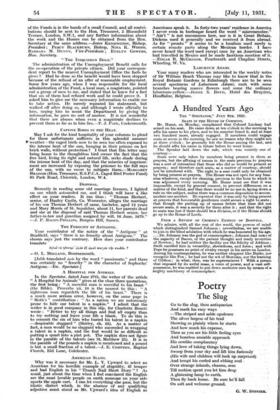A Hundred Years Ago
THE " SPECTATOR," JULY Prm, 1831.
- SEATS IN 'THE HOUSE Or -COMMONS.
Mr. Hume, on Monday, ciimplained -that Colonel Lindsay had seized on his seat. He came down at ten o'clock in -the morning to affix his name to his place, and to his surprise found it, and at leapt twO hundred mcire, already engaged. If members could engage seats at seven in the morning, he saw- no reason why they might net at three o'clock : he generally left the House among the last, and he should affix his name in future before he went home.
The Speaker laid down the rule, which was entirely one of courtesy- Seata were only taken by members being present in them at prayers, but the affixing of names in the seats previous to prayers was a sort of intimation that those who did. so. would be present at prayers ; and therefore such seats, as a matter of courtesy, should not be interfered with. The right to a seat could only be obtained by being present at prayers. The House was not open for any busi- ness whatever, except for cleaning, previous to the hour to which it was adjourned every morning. Mr. Hume must see that it was impossible, except by general consent, to prevent differences on a matter of the kind, and that there Would be no use in laying down-a rule On the subject, unless there was a common disposition to accom- modate one another. He repeated that it was only by being present at prayers that honourable gentlemen could secure a right to seats that though the putting up of names before that time did not secure seats, it was a security for them after it ; and that the right to seats was lost if there should be a division, or if the House should
go up to the House of Lords.


































 Previous page
Previous page